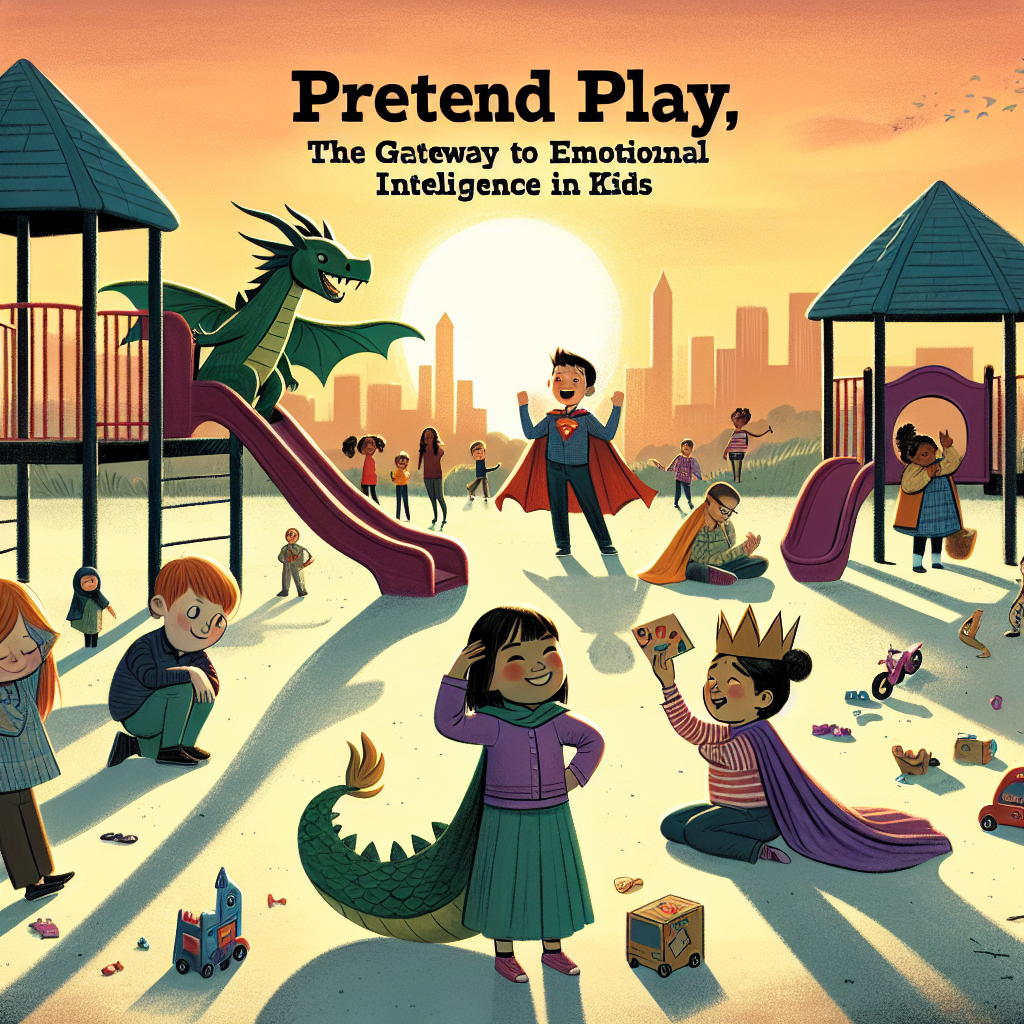
Introduction
Imagine a world where your child effortlessly navigates the complexities of emotions, understands social nuances, and demonstrates empathy towards others. This isn’t just a far-fetched dream; it’s a reality that can be nurtured through one simple yet profound concept: pretend play. Often dismissed as mere child’s play, pretend play is, in fact, a crucial pathway to developing emotional intelligence in children. As we delve into this essential topic, you’ll discover how pretend play: the gateway to emotional intelligence in kids informs their emotional, social, and cognitive development in ways that go beyond our traditional understanding.
The Importance of Emotional Intelligence
Defining Emotional Intelligence
Emotional intelligence (EI) refers to the ability to understand, manage, and utilize one’s own emotions while also being attuned to the emotions of others. It’s a skill that can significantly influence a child’s success in academic and social settings. High emotional intelligence can lead to better relationships, enhanced decision-making, and improved mental health.
The Developmental Journey
Researchers have found that emotional intelligence begins developing in early childhood. Harvard University’s Center on the Developing Child emphasizes the importance of early experiences in shaping a child’s emotional landscape. Pretend play becomes a powerful tool in this intricate developmental journey.
Why Pretend Play?
The Mechanics of Pretend Play
Pretend play is characterized by children engaging in activities that involve role-playing, imagination, and creativity. This could be anything from playing with dolls to acting out scenarios as superheroes. During these activities, children experiment with various roles and situations, which allows them to express their emotions freely and safely.
Table: Key Skills Developed Through Pretend Play
| Skill | Description | Emotional Intelligence Connection |
|---|---|---|
| Empathy | Understanding others’ feelings | Critical for forming relationships |
| Self-regulation | Managing one’s own emotions | Essential for emotional control and decision-making |
| Conflict Resolution | Navigating disagreements in play | Key to social harmony and interpersonal success |
| Perspective Taking | Seeing scenarios from different viewpoints | Fundamental for relating to others |
Real-World Case Studies
Case Study 1: The Power of Role-Playing
In a preschool in San Francisco, a teacher observed two children, Mia and Jake, engaged in an intense game of “grocery store.” They took turns being the cashier and the customer, using play money and grocery items. Throughout the game, they negotiated prices, expressed delight or frustration, and even apologized when mistakes arose. The teacher noted that both children showed signs of empathy, as they comforted each other after a "bad buy." This form of pretend play acted as a gateway for Mia and Jake to develop emotional management skills.
Analysis: This case study highlights how role-playing scenarios allow children to practice empathy and conflict resolution, reinforcing the concept of pretend play: the gateway to emotional intelligence in kids.
Case Study 2: Dramatic Play in Special Needs Education
In an inclusive classroom in New York, teachers introduced dramatic play sessions to benefit children with varying emotional and developmental needs. They created a "hospital" setting where children could take on roles such as doctors, nurses, and patients. Observations showed that children with autism, in particular, benefitted from this setup, as it provided them with a structured way to express their feelings and develop emotional awareness.
Analysis: The structured environment of pretend play facilitated understanding of social cues while encouraging emotional expression, making it a vital tool for enhancing emotional intelligence in diverse settings.
How to Encourage Pretend Play at Home
Strategies for Parents
Offer Open-Ended Toys: Choose toys that promote creativity, such as blocks, art supplies, and costumes, allowing children to build scenarios.
Join the Play: Actively participate in your child’s pretend play. Whether it’s becoming a superhero sidekick or a brave pirate, your involvement can enrich the experience.
Nurture Imaginative Scenarios: Create play settings, such as a “house” or “store,” and encourage your child to fill these roles.
Acknowledge Emotions: During playtime, discuss the feelings triggered by different roles to reinforce emotional learning.
- Limit Screen Time: Reduce passive viewing of media and encourage interactive play, which is fundamental for emotional development.
Conclusion
As parents, educators, and caregivers, understanding the dynamics of pretend play as the gateway to emotional intelligence in kids opens up new opportunities for nurturing emotionally intelligent children. This is not just about fostering creativity; it’s about equipping children with the skills they need to navigate the complexities of life. When we invest time in encouraging pretend play, we lay the groundwork for a generation that can empathize, self-regulate, and foster strong interpersonal relationships.
FAQs
1. What age is best for introducing pretend play?
Pretend play typically emerges around 2 to 3 years of age. Encouraging this play as early as possible can enhance emotional growth.
2. How can I tell if my child is benefiting from pretend play?
Look for signs such as improved communication skills, emotional expression, and increased empathy towards others.
3. Can pretend play help with social skills?
Absolutely! Pretend play allows children to practice social interactions in a safe environment, enhancing their social capabilities.
4. Are there specific types of pretend play that are more beneficial?
Role-playing games, interaction with peers, and structured dramatic play can all be highly beneficial for developing emotional intelligence.
5. How can schools incorporate pretend play into the curriculum?
Schools can create play-centered curricula that involve role-playing scenarios, outdoor activities, and structured group play, allowing children to naturally enhance their emotional intelligence.
In a world that increasingly values emotional intelligence, pretend play stands out as one of the most powerful tools in our parenting toolkit. The journey of nurturing emotionally intelligent kids through creative play begins today!

















